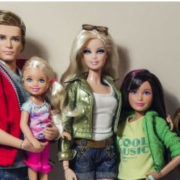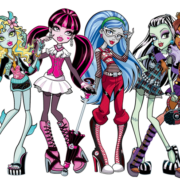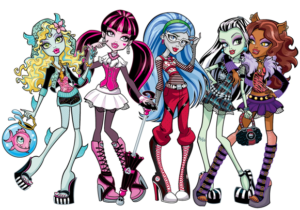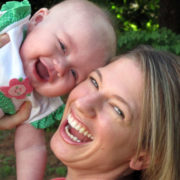About That Fictitious Facebook Family You’re Comparing Yourself to…
 Whenever one of my kids has a problem (like every month!), challenge (every week?) or just drives me bonkers (umm, everyday?), it can feel like nobody else could possibly be going through the same thing. Why? Because what I refer to as the Fictitious Facebook Family (FFF) is perfect. They are always smiling. They are perpetually having fun. Everyone is basking in the happiness of love and seem forever grateful for each and every moment they get to spend together.
Whenever one of my kids has a problem (like every month!), challenge (every week?) or just drives me bonkers (umm, everyday?), it can feel like nobody else could possibly be going through the same thing. Why? Because what I refer to as the Fictitious Facebook Family (FFF) is perfect. They are always smiling. They are perpetually having fun. Everyone is basking in the happiness of love and seem forever grateful for each and every moment they get to spend together.
Well, life isn’t perfect. And not just for you! It’s not like that for me and it’s not like that for those families we compare ourselves to either. Why? Because, as one of my friends said to me once, “we are not in a Norman Rockwell painting!” We are real and human and flawed. Oh- there are periods of bliss, silliness, pleasure, true connection and triumph—yes! But those days or hours are interspersed with frustration, irritation, misunderstanding or sibling rivalry. Screams of joy are intermingled with shrieks of annoyance. They are. And not just once in a blue moon. Often enough that we can all feel like experts on the topic.
It’s funny; but when I speak to friends, colleagues, even professionals about this—they all admit that everyone is dealing with the same thing but nobody seems to talk about it. We laugh about the FFF and how what looks so perfect from far away can look like such a mess up close. It’s not surprising, is it? Life is messy.
The thing is– most people don’t take pictures of the mess. They don’t reveal their feelings about the fight they had with their child that morning or how, if they are being truly raw and honest, that there are moments when they don’t like their kids very much at all. Or how guilty they feel about that. Or sad. Or just plain pissed off.
Well, I’m here to tell you that “perfect” is a bust. The FFF is a farce. And it’s okay. It doesn’t make you a bad person and it doesn’t mean your kids, your spouse or your family are terrible, awful or not good enough. It just means you’re all not perfect.
We are all just learning here.
And loving each other through it.
Loving ourselves through it.
My humble suggestion? Be honest about it. You might just get the support you need. We are all doing the very best we can and on some days, when it gets too messy, we can lean on others who’ve been there, who’ve done that and who’ve gotten to the other side.
And you know what? They’ll love you despite of the mess. Because of the mess. They love your mess!
And that is something to be truly grateful for.
Xoxox,




 Many parents and teachers comment to me that when they are speaking to children or teens, they don’t listen! Does this sound like you? After repeated attempts to get them to put away toys or books, shut off the Ipad, get their jacket or eat breakfast, adults admit that they get so frustrated that they begin to yell, bark orders and take offending items out of the children’s hands to get them to focus.
Many parents and teachers comment to me that when they are speaking to children or teens, they don’t listen! Does this sound like you? After repeated attempts to get them to put away toys or books, shut off the Ipad, get their jacket or eat breakfast, adults admit that they get so frustrated that they begin to yell, bark orders and take offending items out of the children’s hands to get them to focus. Of course, for many children—this is still not enough! I often use a three-sensory approach with my own kids. Crouching down, I look them in the eyes, use my voice to convey what I need them to know and rest my hands softly on their shoulders or arms to ensure full focus.
Of course, for many children—this is still not enough! I often use a three-sensory approach with my own kids. Crouching down, I look them in the eyes, use my voice to convey what I need them to know and rest my hands softly on their shoulders or arms to ensure full focus.
 The other day, my children, ages 6 and 7, asked me why people were protesting at the Town Hall building we passed after leaving the animal shelter we visited. People were holding up signs saying; “Black Lives Matter” while police patrolled the area from the perimeter. Even though I knew it might be a tough conversation to have, it felt necessary. It felt on purpose. You know what I mean?
The other day, my children, ages 6 and 7, asked me why people were protesting at the Town Hall building we passed after leaving the animal shelter we visited. People were holding up signs saying; “Black Lives Matter” while police patrolled the area from the perimeter. Even though I knew it might be a tough conversation to have, it felt necessary. It felt on purpose. You know what I mean?




 If you think about it, if we aren’t making mistakes, it may be because we aren’t trying something new or we aren’t truly engaging in the learning process. Without mistakes, how would we know that we do our best when we have more time to study (and worse when we leave it until the last minute)? Without mistakes, how would we learn when we get our best work done, where and when we are the most productive (and when we are not), who are the right people to surround ourselves with and who drag us down? We must love ourselves as the learners we are and realize that without learning, there would be no growth. As leaders, growth is what makes us better, stronger and more skilled.
If you think about it, if we aren’t making mistakes, it may be because we aren’t trying something new or we aren’t truly engaging in the learning process. Without mistakes, how would we know that we do our best when we have more time to study (and worse when we leave it until the last minute)? Without mistakes, how would we learn when we get our best work done, where and when we are the most productive (and when we are not), who are the right people to surround ourselves with and who drag us down? We must love ourselves as the learners we are and realize that without learning, there would be no growth. As leaders, growth is what makes us better, stronger and more skilled.
 Do you or those with whom you work or live often give up or shut down when a skill or concept is a bit out of reach? Are you or those you work with using language like; “it can’t be done,” “I can’t do it,” “I don’t know how,” or “It can’t happen?” You might be dealing with a fixed mindset that needs to be shifted so you (or the person in question) can grow.
Do you or those with whom you work or live often give up or shut down when a skill or concept is a bit out of reach? Are you or those you work with using language like; “it can’t be done,” “I can’t do it,” “I don’t know how,” or “It can’t happen?” You might be dealing with a fixed mindset that needs to be shifted so you (or the person in question) can grow.
 My daughter is rounding the corner to age seven in February and if there is one thing I’ve discovered in the time that I’ve been her mother, it’s that all “big talks” are really just a series of small conversations about big issues. Body image is no exception.
My daughter is rounding the corner to age seven in February and if there is one thing I’ve discovered in the time that I’ve been her mother, it’s that all “big talks” are really just a series of small conversations about big issues. Body image is no exception.
 How to Talk to Kids about the Paris Attacks and Other Tragic Events
How to Talk to Kids about the Paris Attacks and Other Tragic Events
 We all get that feeling that we are messing up our children sometimes. I do too. Often…if I’m being honest.
We all get that feeling that we are messing up our children sometimes. I do too. Often…if I’m being honest.